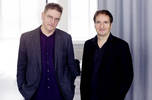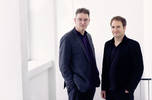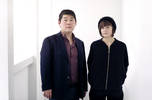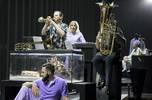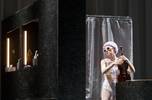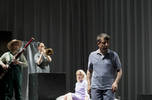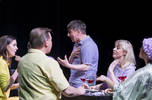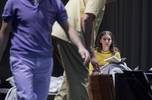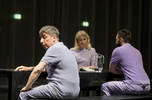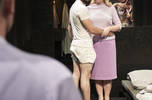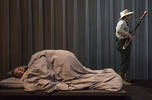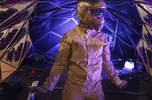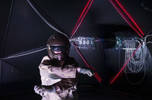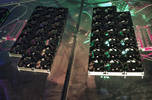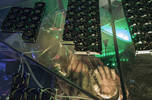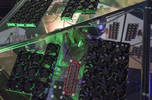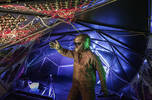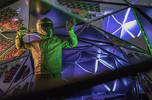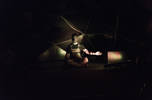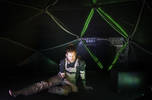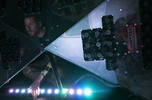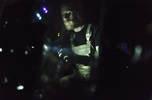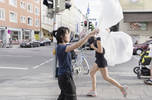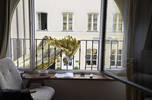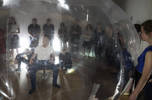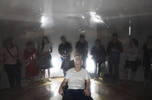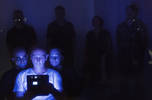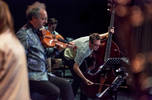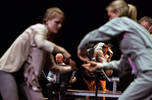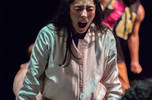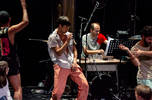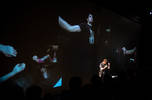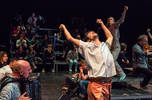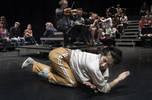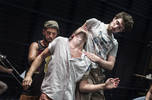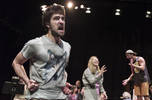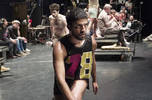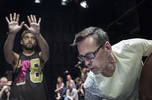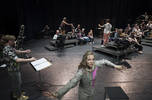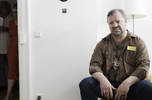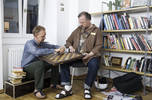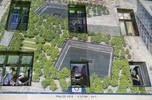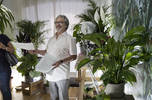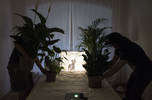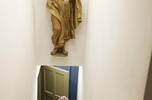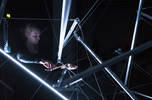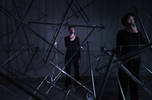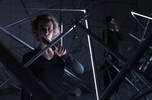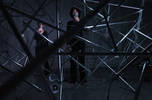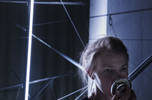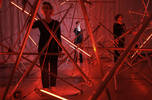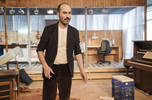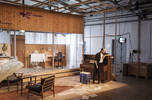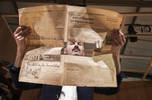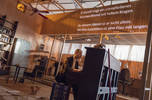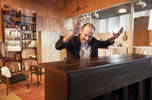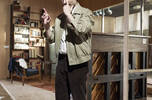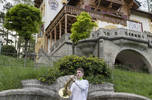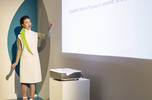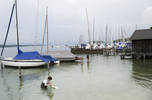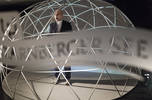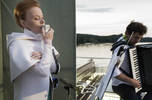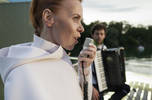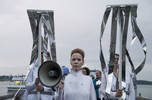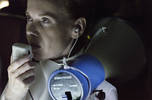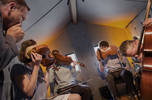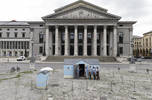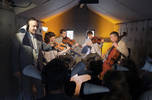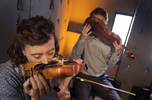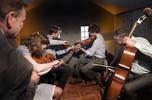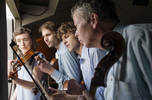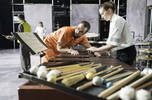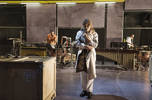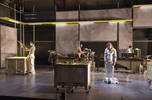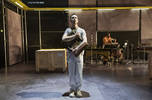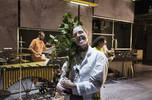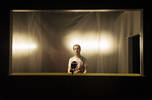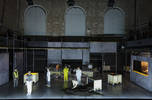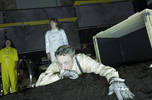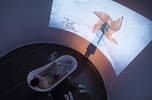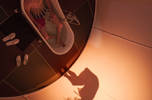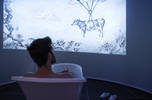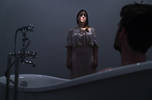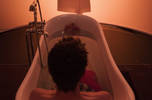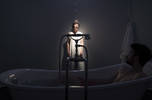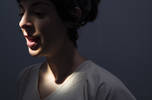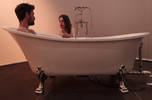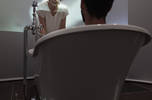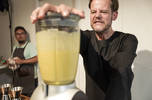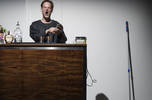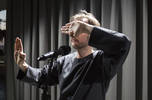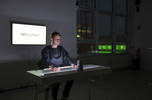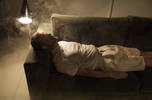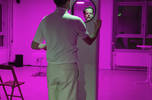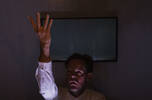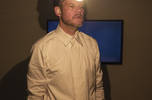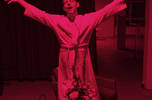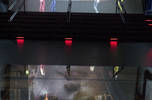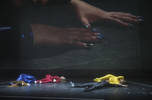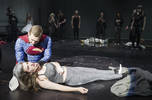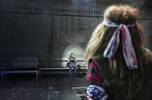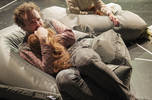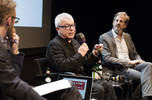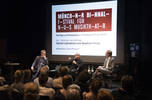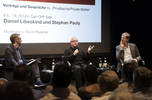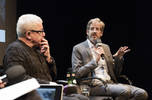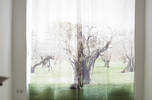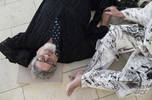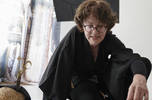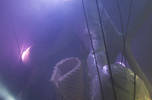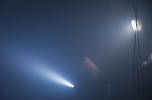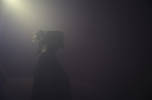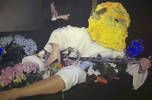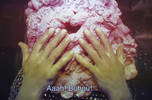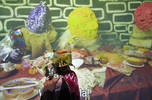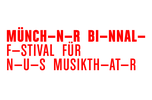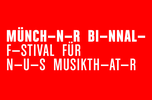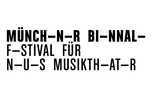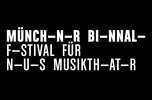PR contact
presse@muenchenerbiennale.de
Kathrin Hauser-Schmolck
Hauser-Schmolck Musik & PR, Basel
phone +41(0)614220539
Press Information
Munich Biennale
The Munich Biennale is worldwide the only festival that shows exclusively world premieres of new music theater works. In the past the festival has opened up a multitude of opportunities for young composers to test themselves and their artistic ambitions at the highest level.
When Dr. Hans-Georg Küppers, the director of the Department of Arts and Culture of the City of Munich, asked us whether we were interested in taking over starting in 2016 as the artistic directors of this special festival, we were not only surprised and extremely pleased about the wonderful prospects, we also immediately saw the confidence placed in us as a challenge to continue the extremely successful history over the last decades and to continue developing new contents and formal dimensions. Once again two composers were asked to take over as successors to the composers Hans-Werner Henze and Peter Ruzicka. This alone speaks its own language.
Music theater is to us more than just a genre-related, sensuous delight. The classic composition term has been expanded. And for very good, comprehensible reasons. Our phenomenological relationships, in particular concerning aesthetic and formal frameworks, are happening all at once, irrespective of the grave political changes. How do the arts react? Or even better: how they act! For what is invented, experimentally compacted, and attempted in a model experiment, bound seemingly only by the genuine and the beautiful, soon finds itself – frequently under other names and masks – in completely different social relationships, not the least in advertising, film, communication and media. But also there where news is conveyed and opinions are formed. To us this means opening up and protecting the art realm as a place for research. The expanded composition term encompasses very different formats. From new opera to scenic installation, from minimalized artistic interventions in municipal spaces to composed performance – just to name a few.
This spectrum forms a realm that our social »multilingualism«, the everyday media polyphony, artistically acuminates and reflects. For this reason new music theater has become an open field, which can illuminate social and even political questions under special conditions.
We are looking forward to the 16th Münchener Biennale (2. - 12. of June, 2018) with you.
Daniel Ott, Manos Tsangaris
Januar 2018
Biografies: Daniel Ott / Manos Tsangaris
Daniel Ott
Born in 1960 in Grub, in the Appenzell region of Switzerland.
Composer, pianist, theatermaker, author of landscape-based works.
Studied piano, established independent theater groups, and a street theater group with a stage on a wagon drawn by horses. Studied theater in Paris and London, and composition under Nicolaus A. Huber and Klaus Huber.
In particular, and this since 25 years: works as a composer, pianist, innovator in the field of new music theater, interdisciplinary and situation-related. Founded the festival »neue musik rümlingen«. Lectureship in experimental music for ten years in Berlin.
Music theater productions for, among others, Staatsoper Stuttgart; Theater Bielefeld, Donaueschinger Musiktage; and Wittener Tage für neue Kammermusik. Situation-based works for Expo Hannover (music in the Swiss pavilion by Peter Zumthor); MMK Museum für Moderne Kunst Frankfurt/Main; the Alpentöne festival in Altdorf, Switzerland; and Wasserturm Prenzlauer Berg in Berlin.
Landscape compositions for the harbor on the island of Rügen, the pilgrimage site Heilikreuz in Entlebuech, Switzerland; the Neisse River between Görlitz and Zgorzelec; the Rhine Harbor in Basel; the Elbe River near Hitzacker, and the Ruhr near Witten.
He has been a professor of composition and experimental music theater at the Berlin University of Arts since 2005, and a member of the Berlin Academy of Arts since 2015
As of 2016 co-artistic director with Manos Tsangaris of the Munich Biennale – Festival of New Music Theater.
Manos Tsangaris
Born in 1956 in Düsseldorf, Germany.
Composer, drummer, installation artist, protagonist of new music theater.
Studied under Mauricio Kagel (composition) and Christoph Caskel (percussion) at the Hochschule für Musik und Tanz Köln (HfMT). Studied under Alfonso Hüppi at the Kunstakademie Düsseldorf.
Fundamentally: Research on an expanded composition term that radically places the person in the center. Examinations of the interfaces between images, sound, word, and scene – and their syntheses in a universally comprehended new music theater.
Regular performances of his works at renowned international festivals (Donaueschinger Musiktage; Wittener Tage für neue Kammermusik; Belgrade International Theatre Festival (BITEF); MusikBiennale Berlin; Venice Biennale; Ultima festival in Oslo; Tonlagen Dresden; Warsaw Autumn (Warszawska Jesień). For 25 years his installative and visual works have been shown in important galleries and museums across the globe.
Initiator of the congress Praemoderne in Cologne. Recipient of the Bernd Alois Zimmermann scholarship of the City of Cologne; the scholarship of Akademie Schloss Solitude Stuttgart; the art award of the Berlin Academy of Arts; and an honorary guest at Villa Massimo. Instructor of trans-disciplinary composing, director of the academy project European Center for the Arts Dresden.
Lecturer at the Darmstädter Ferienkurse; professor of composition at the Hochschule für Musik Carl Maria von Weber Dresden since 2009; a member of the Berlin Academy of Arts (director of the music department since 2013); and a member of the Saxon Academy of Arts since 2010.
As of 2016 co-artistic director with Daniel Ott of the Munich Biennale – Festival of New Music Theater.
Questions and Answers
Questions to Daniel Ott and Manos Tsangaris
WHO ARE YOU?
DO Manos Tsangaris is a Greek Rhinelander. A composer who has dealt for decades with music theater and with very different formats. Percussionist, native of Cologne … Did I describe you well enough?
MT Together we are DOMTS: Daniel Ott and Manos Tsangaris. And this DO, an original Swiss-Berliner composer – who has a fatal tendency to work with other people, who also likes to work in landscape compositions, who listens to nature and the environment and transforms all of that into compositional thinking. And we together …
DO ... yes, together we work small-big. For a while Manos leaned toward very small formats, toward music theater in small spaces, sometimes with ten participants and one member of the audience – he thus reversed the customary relationship between the audience and the performers. Manos, however, sometimes also thinks very big, and I sometimes think very tiny.
WHAT CAN YOU DO? ALONE? TOGETHER?
DO Manos can play the drums and compose. And together we can conceive a biennale.
MT The two of us can be doubtful and decide things, the two of us can …
DO … interrupt each other, we can't do that when we're alone.
MT The two of us can contradict one other.
DO We can argue, we can discuss …
MT … we can check out young artists, with each other. And alone: sleep.
WHAT SHOULD NEW MUSIC THEATER DO?
MT It should do nothing at all. It can do a lot and shouldn't have to do anything, then it wouldn't be what it is about.
DO Music theater could change the world, it can get involved in social, political processes, and it's very important to me that music theater instigates dialogues.
MT To me it's important that it can become art.
DO Art also means: communication.
MT I have no idea.
WHERE DOES MUSIC THEATER STAND TODAY? COMPARED TO 20 YEARS AGO?
MT We're living in a world that has many more voices than 20 years ago. Video and loudspeakers are omnipresent in everyday life. The machines of the general public reach out for us like tentacles. That also has an effect on music theater. The formats are more flexible. Compositional thinking faces completely different challenges nowadays. The game has been expanded and requires precise rules and developments ...
DO ... that constantly want to be discovered anew.
THE ROLE OF THE COMPOSER?
DO The role of the composer in music theater is very central. We have often talked about writing, about the fact that processes can be notated. To me the composer is also a team player who, when he creates music theater, has to think together with people from other crafts, has to talk about what will become of the »music theater« genre, and where his role is.
MT To write works that are good.
WHAT IS THE MUNICH BIENNALE?
MT A laboratory and a celebration.
WHAT DOES THE BIENNALE WANT TO DO?
DO The Munich Biennale would like to communicate, but it would also like to try things. And perhaps it doesn't yet know everything that it would like in five years. Most of all, the Biennale wants to engage in processes. Engage in processes, and in dialogues with young artists who want to »create art«. But it would also like to engage in a dialogue with the city, with people who live in Munich. It would like to engage in an audience and ask questions. I believe the Biennale doesn't have all of the answers.
MT To open the space that's necessary and also possible for music theater – that means, one has to do the one thing and cannot ignore the other thing. One has to connect with the possibilities that are inherent – also the formal possibilities and the manner in which pieces are written and performed. But we must also open the space for the unknown.
FOR WHOM?
DO For everyone.
WHAT ARE YOU LOOKING FORWARD TO?
MT To the Biennale. To working with all the people.
DO We are looking forward to sleepless nights, to endless discussions, to disputes, and we are looking forward to the residents of Munich ...
Press Kit
Here you can download the press information and the press kit to the press conference:
Preface Dr. Hans-Georg Küppers here
Dates & Facts of the Munich Biennale 2018 here
Program Overview Munich Biennale 2018 here
Introduction here
Premieres, discourses, plattforms here
Press Photos
only for press purposes and free of charge
Artistic Direction
We Made of Glas
Royal Membrane Works - Nomictic solutions
Interdictor
Bubble <3
Third Space
Nachlassversteigerung
skull ark, upturned with no mast
Ein Porträt des Künstlers als Toter
Königliche Membranwerke - Nomictic Solutions
Tonhalle (Max-Joseph-Platz 1b)
Alles klappt
Bathtub Memory Project
Up Close and Personal
liminal space
Lectures and Conversations on "Private Matter"
regno della musica - TERRA
The Munich Ø-Trilogy
Downloads
If the logos of the Munich Biennale available below not meet your requirements, you can download the logo systematics of Munich Biennale here as a PDF document and request the favoured logos under info@muenchenerbiennale.de.

